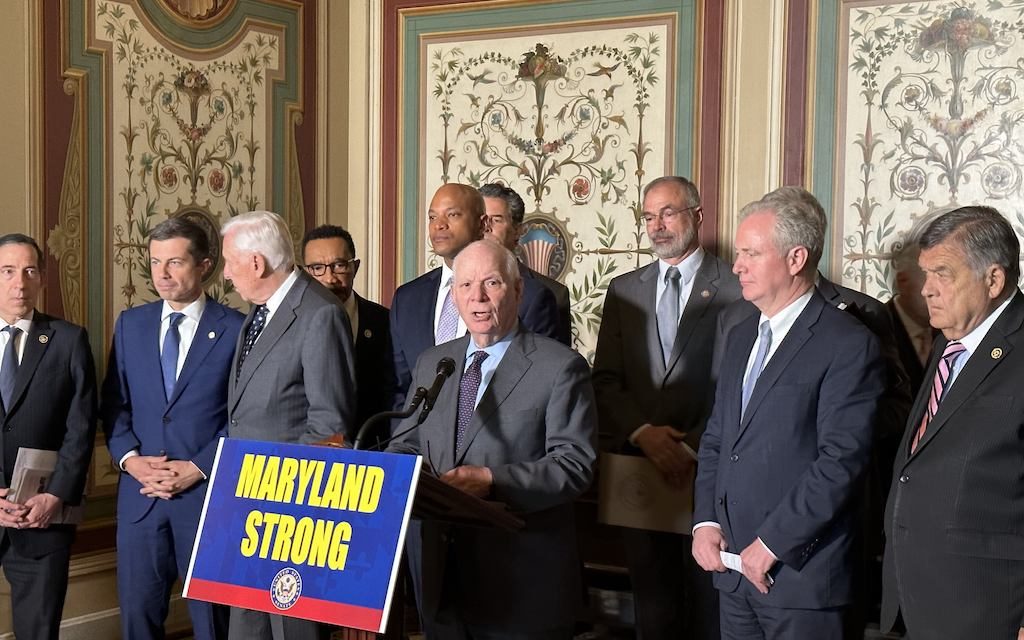By KATHARINE WILSON
Capital News Service
WASHINGTON – The Maryland congressional delegation on Tuesday predicted bipartisan support for federal funding to rebuild the Francis Scott Key Bridge.
“Tragedy knows no partisanship,” Rep. Andy Harris, Maryland’s lone Republican in Congress and a member of the House Freedom Caucus, said during a press conference following a Capitol Hill meeting involving the entire Maryland congressional delegation, Gov. Wes Moore, Transportation Secretary Pete Buttigieg and other officials. “I’m committed to make sure that we navigate this through a bipartisan process.”
Some members of the House Freedom Caucus have been skeptical of an entirely federally-funded bridge reconstruction and have offered tough conditions for congressional approval, as reported by Politico.
Sen. Ben Cardin, D-Maryland, announced that he soon will be introducing legislation with Sen. Chris Van Hollen, D-Maryland, to clarify that the funds for the replacement of the Key Bridge will come entirely from the federal government.
President Joe Biden committed the federal government to pay for the entire cost of rebuilding the bridge on the day of the collapse.
“I believe you’ll find that there’s going to be bipartisan support to do everything we need to to carry out President Biden’s commitment,” Cardin said.
The Biden administration approved an initial $60 million of quick-release emergency relief funds to the Maryland Department of Transportation on March 28. Those funds are being used for immediate wreckage removal and to prepare for the building of a replacement bridge, according to Buttigieg.
The emergency relief funds can cover 90% of a new bridge, according to Van Hollen. The senators’ legislation will allow the funds to cover the remaining 10% and detail how funds from any settlements will be used.
A 100% federal cost provision has been used for previous bridge collapses, including the 2007 failure of the I-35W span in Minneapolis, according to the White House.
Any funds received through lawsuits and liability settlements from third parties will go to relieve taxpayers, Cardin said. The senator and Buttigieg emphasized that the federal government cannot wait for insurance matters to be settled before sending relief funds.
“We are not going to wait for these to play out to get the dollars where they need to be,” Buttigieg said.
The Key Bridge collapsed into the Patapsco River on March 26 after a container ship leaving Baltimore Harbor lost power and crashed into support beams, killing six members of a construction crew.
There are no cost estimates at this time for the replacement bridge, Cardin confirmed. The Key Bridge, opened in 1977, originally cost $110 million, according to the Maryland Transportation Authority.
The bridge collapse temporarily closed the Port of Baltimore, which directly employs over 8,000 workers and has an annual economic impact of $70 billion, according to the governor’s office.
“A part of our soul fell into the Patapsco River,” Moore said at the news conference.
Moore on Friday issued an executive order allocating $60 million in state funds to workers and businesses impacted by the bridge collapse. The funds will go towards relief programs and business loans.
The governor created the Maryland Tough Baltimore Strong Alliance, a group of 80 businesses and organizations that have agreed to support Baltimore and the state.
Moore on Tuesday signed the Maryland Port Act, giving funds to port businesses and workers impacted and setting up a scholarship fund for the children of the six victims of the collapse.
Two alternative shipping channels have opened since the collapse and a third channel is expected to open this month that will handle a majority of port traffic, Cardin said.
Van Hollen said it is now up to Congress to execute the promise of the executive branch and to ensure that there are enough emergency relief funds remaining for other infrastructure projects and disaster aid around the country.




Recent Comments